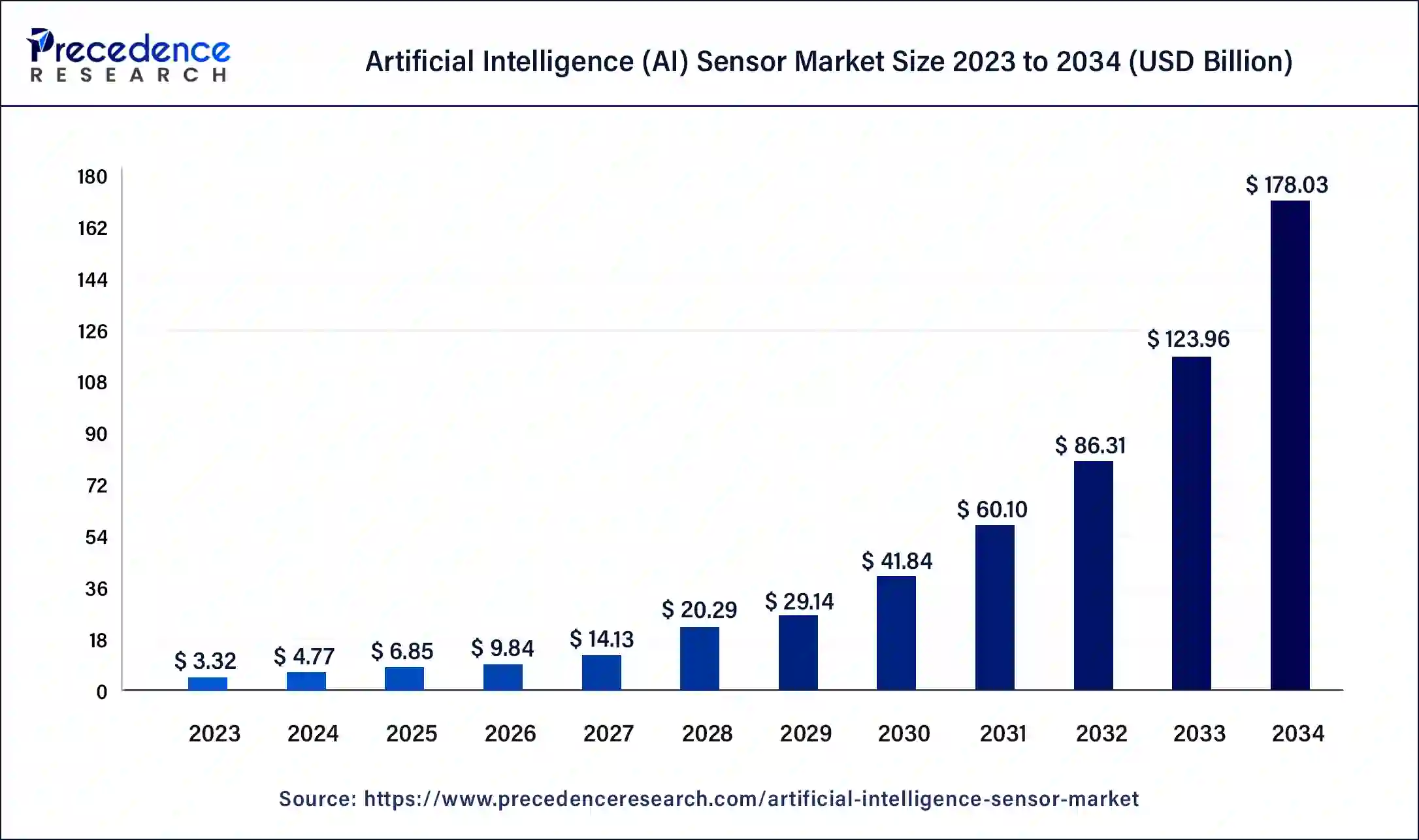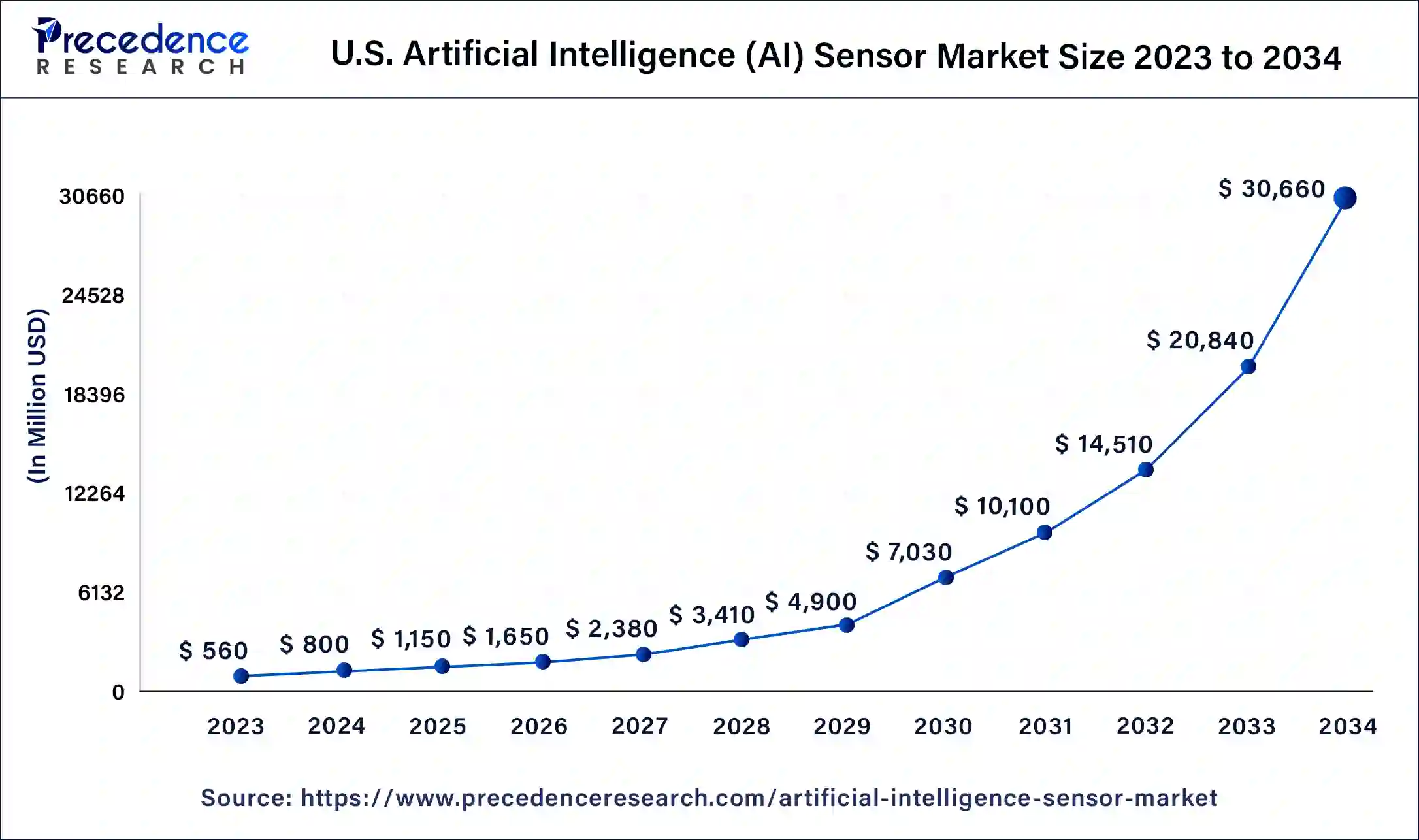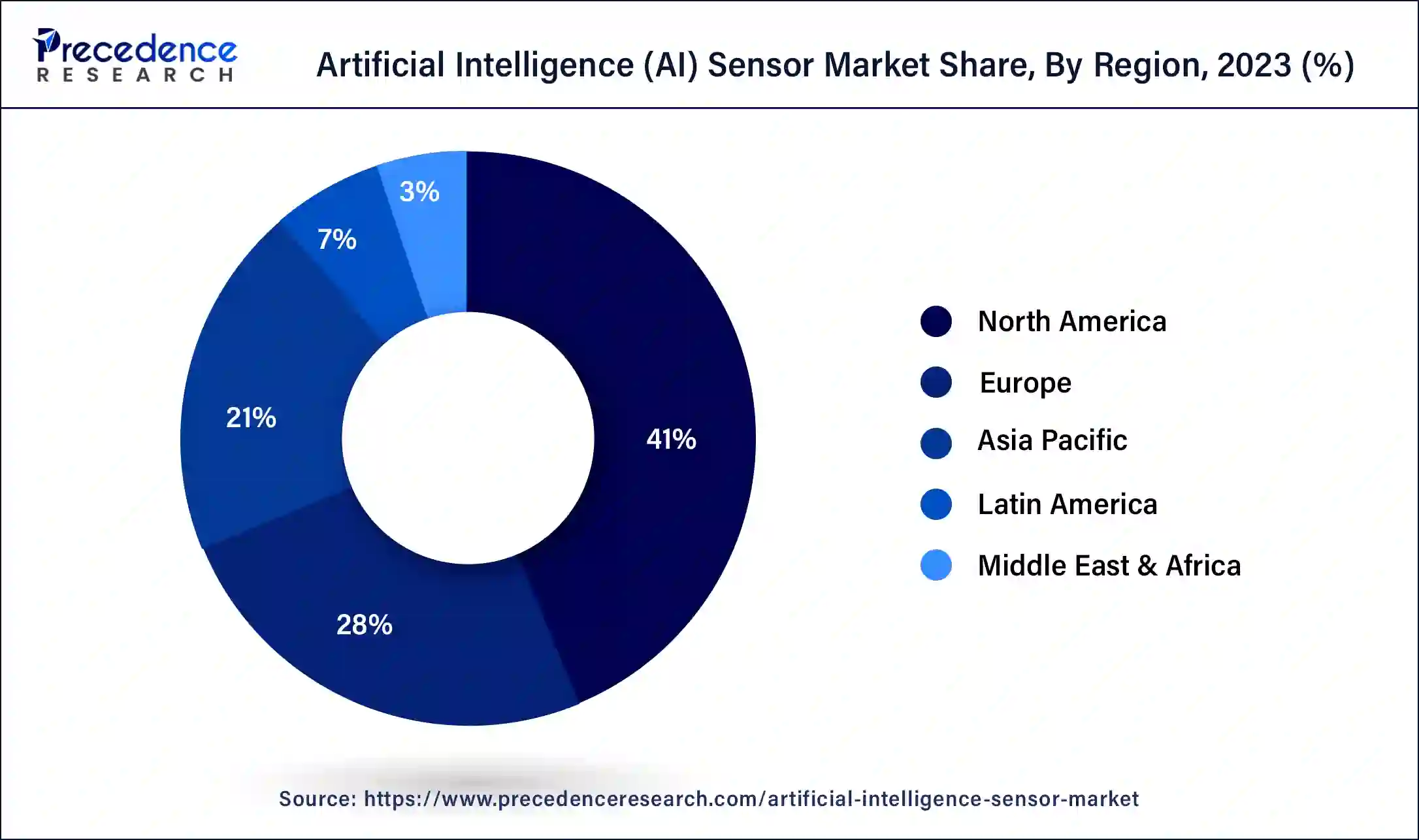January 2025
Artificial Intelligence (AI) Sensor Market (By Technology: NLP, Machine Learning, Computer Vision, Context-aware Computing; By Sensor Type: Pressure, Temperature, Optical, Position, Ultrasonic, Motion, Navigation, Others; By Application: Automotive, Consumer Electronic, Manufacturing, Aerospace & Defense, Robotics, Smart Home Automation, Healthcare, Others) - Global Industry Analysis, Size, Share, Growth, Trends, Regional Outlook, and Forecast 2024-2034
The global artificial intelligence (AI) sensor market size was USD 3.32 billion in 2023, calculated at USD 4.77 billion in 2024 and is expected to reach around USD 178.03 billion by 2034. The market is expanding at a solid CAGR of 43.62% over the forecast period 2024 to 2034. The North America artificial intelligence (AI) sensor market size reached USD 41% billion in 2023. The surge in government investment in Artificial Intelligence (AI) research and development is anticipated to accelerate the market’s growth.
The global sensor market size is calculated at USD 9.47 billion in 2024, reaching USD 508.64 billion by 2032.

The U.S. artificial intelligence (AI) sensor market size was exhibited at USD 560 million in 2023 and is projected to be worth around USD 30,660 million by 2034, poised to grow at a CAGR of 43.89% from 2024 to 2034.

North America held the dominant share of the Artificial Intelligence (AI) sensor market in 2023. The region is observed to witness notable growth during the forecast period. The growth of the North American region is driven by the increasing consumer inclination toward AI-enabled home appliances, rising technological developments in autonomous cars, and the rising need for automation and the integration of AI in smart devices. The region has a stronghold in technological infrastructure, the presence of key market players, rising deployment of industrial automation, and supportive government regulations that escalate the adoption and development of Artificial Intelligence (AI) Sensor technologies.
Additionally, North America has a strong ecosystem of industries such as automotive, manufacturing, healthcare, and defense that rely on AI. These sectors make significant investments in AI-driven applications which spurs the demand for Artificial Intelligence (AI) Sensors. The United States presents a significant opportunity for the market’s growth. The country is a hub for leading tech giants and start-ups focusing on AI and sensor technologies, bolstering the demand for Artificial Intelligence (AI) Sensors. The United States also presence of reported research institutions and universities that actively contribute to Artificial Intelligence (AI) Sensor technology advancements. Such factors are responsible for the considerable growth of the Artificial Intelligence (AI) Sensor market in the region.

Asia Pacific is observed to expand rapidly during the forecast period. Whereas with the overall growth, the region is observed to hold the dominating share in the predicted timeframe. Factors such as robust growth in manufacturing capabilities, growing demand for ai-driven applications, surge in investments in R&D activities, increasing demand for consumer electronics, increasing adoption of industry 4.0, rapid expansion of the automotive industry, growing demand for IoT Devices, increasing advancement in healthcare infrastructure, rising focus on environmental monitoring, and favorable government initiatives and regulations have contributed to the overall growth of the market.
Developing countries such as Japan, China, and India have been adopting early adopters of AI technologies and integrating them into several industries. China is aggressively investing in Artificial Intelligence (AI) Sensor technology which drives innovation across various areas including voice recognition, facial recognition, autonomous systems, and others. The region’s has also witnessed unprecedented growth of the economy owing to rapid industrialization & urbanization, a large population base, and rising disposable incomes, which is expected to accelerate the demand for Artificial Intelligence (AI) Sensors. In addition, the rising acceptance of Artificial Intelligence (AI) Sensors in smart cities, healthcare, robotics, and smart manufacturing is expected to boost the growth of the market in the region.
Sensors are devices that detect and measure physical properties and any environmental changes and then convert this information into a format for the machines to understand. These devices serve as the eyes, tongue, nose, and ears, of AI systems, facilitating them to collect data accurately and make informed decisions. Artificial Intelligence (AI) is widely used for processing and analyzing data from sensors, such as thermal cameras, temperature sensors, photocells, ultrasonic sensors, motion sensors, LiDAR, radar, vision cameras, and motion sensors.
Merging AI with sensors is an innovative and powerful way to understand and influence the surroundings. Sensors gather data about the physical world and Artificial Intelligence (AI) analyzes and utilizes this useful data to generate predictions, insights, and take prompt action. Artificial intelligence (AI) sensors can perform several complex tasks including self-adaptation, self-validation, and self-identification under various conditions. Artificial intelligence sensors are used in a wide range of applications such as industrial automation robotics, autonomous vehicles, smart homes, healthcare, and others.
| Report Coverage | Details |
| Market Size by 2034 | USD 178.03 Billion |
| Market Size in 2023 | USD 3.32 Billion |
| Market Size in 2024 | USD 4.77 Billion |
| Market Growth Rate from 2024 to 2034 | CAGR of 43.62% |
| Largest Market | North America |
| Base Year | 2023 |
| Forecast Period | 2024 to 2034 |
| Segments Covered | Technology, Sensor Type, Application, and Regions |
| Regions Covered | North America, Europe, Asia-Pacific, Latin America, and Middle East & Africa |
Rising demand for industrial automation
The increasing demand for industrial automation is expected to boost the expansion of the Artificial Intelligence (AI) Sensor market in the coming years. Artificial Intelligence (AI) Sensor enables the development of intelligent robots that are capable of performing complex tasks autonomously. During manufacturing operations and industrial production, Artificial Intelligence (AI) Sensors are used to automate processes, improve efficiency, decrease downtime, and reduce errors. Artificial Intelligence (AI) Sensors are widely used to monitor the position of components on an assembly line, identify defects in items, and control the movement of robotic arms. In industrial automation, Artificial Intelligence (AI) Sensors are extensively used to control manufacturing processes and can monitor important parameters including pressure, temperature, humidity, and others. Thereby driving the market’s growth.
The industrial sector also benefits from artificial intelligence (AI) sensors, particularly in predictive maintenance and smart manufacturing. Companies like Siemens and General Electric use Artificial Intelligence (AI) Sensors to monitor machinery conditions in real time. These sensors can predict equipment failures before they occur, reducing downtime and maintenance costs. This application not only enhances operational efficiency but also extends the lifespan of industrial equipment.
High installation and maintenance costs
The high installation and maintenance costs are anticipated to hamper the Artificial Intelligence (AI) sensor market’s growth. The deployment of Artificial Intelligence (AI) sensors requires significant investment as advanced technology and infrastructure are required. Additionally, the maintenance costs of these sensors generally incur additional costs over time. Several lower and middle-income countries lack technology infrastructure which is likely to limit the expansion of the global Artificial Intelligence (AI) sensor market.
Rapid expansion of the automobile sector
The rising demand for connected cars is projected to offer lucrative opportunities to the market during the forecast period. Artificial Intelligence (AI) improves the performance of vision-based sensing systems. The rapid advancement in artificial intelligence (AI) and the Internet of Things (IoT) have significantly increased the adoption of autonomous vehicles and connected cars globally which enhances safety and reduces the risk of accidents caused by unpredictable and reckless driving. The future of the automobile industry is heavily dependent on Artificial Intelligence (AI) Sensors. The autonomous vehicle uses a wide range of Artificial Intelligence (AI) Sensors such as lidar, ultrasound sensors, radar, and vision cameras.
The sensor system in the vehicle alerts drivers regarding accidents, traffic lights, poor road conditions, traffic jams, and others. Artificial Intelligence (AI) Sensors enable the car to drive itself and make the right decisions at the right time. Self-driving vehicles use Artificial Intelligence (AI) Sensors to detect surroundings and navigate roads without human assistance and respond to them by taking necessary and appropriate actions. Therefore, considering these factors, the deployment of Artificial Intelligence (AI) Sensors in autonomous and connected cars drives the growth of the Artificial Intelligence (AI) Sensor market.
The machine learning segment held the largest segment of the Artificial Intelligence (AI) Sensor market in 2023, which is expected to sustain its position throughout the forecast period. Machine learning is capable of performing tasks without being explicitly programmed instead of depending on patterns and inferences. Machine learning algorithms play a crucial role in analyzing sensor data. Machine learning can make real-time predictive analytics that enables users to reduce risks and monitor controls effectively. Machine learning can handle large and complex datasets, along with the robust advancements in hardware and software, that have led to its widespread adoption.
The context-aware computing segment is expected to grow significantly during the forecast period. The substantial growth of the segment is attributed to the rapid technological advancements in sensors that are capable of capturing in-depth environmental data. These sensors can gather information including temperature, location, light, sound, and motion, which is important for context-aware computing systems.
The optical segment accounted for the dominating share of the Artificial Intelligence (AI) Sensor market in 2023 and is expected to sustain the position during the forecast period owing to the increasing demand for visual data processing and analysis bolstering the growth rate. Optical sensors play an integral role in capturing and analyzing visual data due to the rising adoption of AI technologies and the rapid development of applications relying on computer vision. The market has witnessed the increasing adoption of optical sensors in a wide range of applications across various fields such as autonomous cars, industrial automation, consumer electronics, robotics, healthcare, and others.
The ultrasonic segment is observed to grow at a notable rate in the global Artificial Intelligence (AI) Sensor market over the forecast period. This growth of the ultrasonic sensors segment is driven by the rising adoption of robotics, automation, and autonomous systems in several sectors including logistics, healthcare, agricultural, manufacturing, and automotive industries. Moreover, the rising sales of autonomous automobiles are expected to support the growth of the ultrasonic sensors segment. In the automotive sector, ultrasonic sensors offer a variety of applications such as safety alarms, parking assistance, collision avoidance, automatic braking systems, object detection, and others. Such factors accelerate the growth of the segment.
The consumer electronics segment held the largest share of the Artificial Intelligence (AI) Sensor market during the forecast period owing to the increasing demand for consumer wearable devices, smart home appliances, and other smart portable devices. The integration of Artificial Intelligence (AI) Sensors into consumer electronic devices is gaining significant popularity including smartwatches, smart home appliances, smart speakers, and smartphones. Consumer electronics require Artificial Intelligence (AI) Sensors to support various attractive features such as voice control, gesture control, facial recognition, and gesture control. Such features improve user experiences and have boosted the demand for Artificial Intelligence (AI) Sensors. Thus, the wide application of AI in consumer electronics is fuelling the growth of the segment.
The smart home automation segment held a significant share of the Artificial Intelligence (AI) Sensor market in 2023. Consumers increasingly seek automated solutions for home management, enhancing convenience and energy efficiency. Smart home automation offers advanced security options, such as AI-powered surveillance cameras and smart locks, which are highly valued by consumers. Artificial Intelligence (AI) Sensors help in monitoring and optimizing energy usage, leading to cost savings and environmental benefits, driving their adoption in smart homes.
The healthcare segment is expected to grow notably. Artificial Intelligence (AI) Sensors are reshaping the healthcare sector by enabling real-time patient monitoring, offering treatment options, early disease detection, and advancing diagnostics centers. Wearable smart devices such as the Apple Watch and Fitbit incorporate Artificial Intelligence (AI) Sensors that help to track several important signs including oxygen levels, heart rate, sleep patterns, and others. These smart devices use Artificial Intelligence (AI) to accurately analyze the collected data and provide users with crucial health insights to promote preventive care.
AI-powered sensors embedded in diagnostic equipment, wearable devices, and medical implants enable continuous monitoring of important signs, early detection of disease, and improved healthcare interventions. The use of Artificial Intelligence (AI) Sensor technology in healthcare has significantly increased in medical facilities and it supports the treatment, drug development, diagnosis, and monitoring of patients’ health regularly as well as contributes to personalized medicines that further drive the segment growth.
Segments Covered in the Report
By Technology
By Sensor Type
By Application
By Geography
For inquiries regarding discounts, bulk purchases, or customization requests, please contact us at sales@precedenceresearch.com
No cookie-cutter, only authentic analysis – take the 1st step to become a Precedence Research client
January 2025
November 2024
February 2025
February 2025